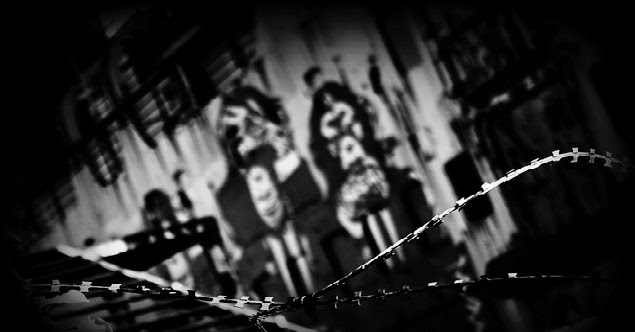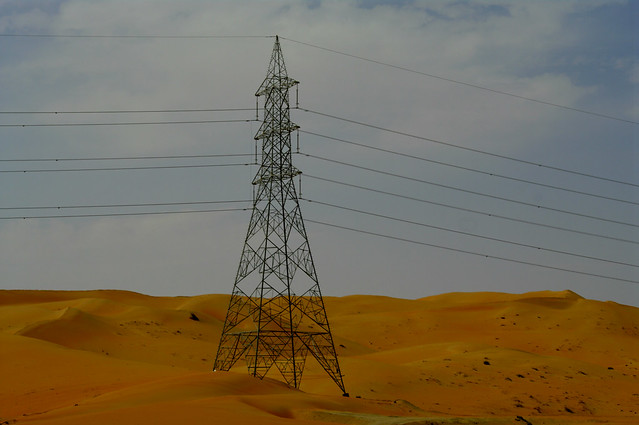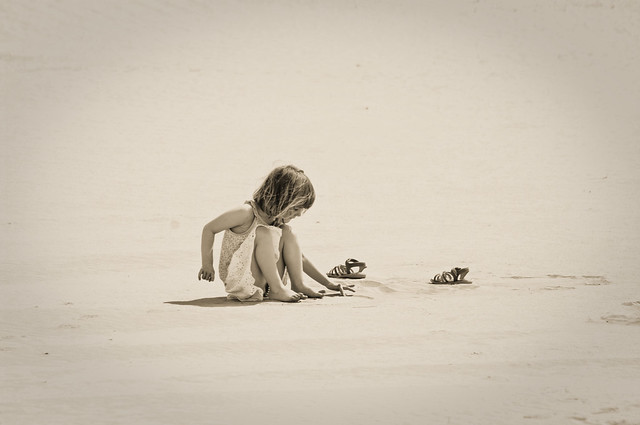Every now and then, I drag poor Tin Dog and any other fools I can find to foreign lands such as Chernobyl for a bit of "Boys Own" and an explore, this one was all a bit last minute.
Well, over again to the ever wordy guest writer Tin Dog....
Well, over again to the ever wordy guest writer Tin Dog....
2014
Via Brussels
The journey is half the trip, so they say. They have never had to endure Brussels Brussels Brussels
There are endless escalators with directions
to hither and thither in Flemish - it’s designed just for fun.
Not yours or mine, of course.
Airport Entertainment
At the tail end of the waiting hordes a
pilot and his crew sashayed their way past us, gate bound and expecting
speedy boarding and access all areas.
The windows of the passport control booths
were only twenty metres away when they saw the whites of the pilot’s eyes. A
border guard somehow raised himself above a custom’s desk booth to look down
from on high, casting his petulant eye over the unwashed mob from a raised
vantage.
Shouts and demands were made from both
sides, in languages unfathomable. It soon descended into the language of
swearing and threats, English. The stand off was revealed.
The self aggrandising flight captain of Michelle
De Souris Airways had made a vainglorious entrance, to jump the enormous passport
control queue.
A small man in black slacks, white shirt
with packet creases and a giant, gold braided, peaked captain’s hat had
demanded preferential treatment. We could all tell that he was frightfully important
because of his fabulously giant hat and the phalanx of cheaply glamorous flight
crew. Undaunted, our border guard proceeded to calmly and firmly stand his
ground.
“You all have to queue.” stated our new
hero, with the emphasis on all.
“We are crew and have dispensation.” The
Captain made his stand. He was indignant and assertive, like a child denied his
toy.
“You have no special dispensation if you
are not piloting a flight. You are passengers.”
“We are flight crew and demand our right to
board.”
“It’s not your flight. You are passengers.
You must join the queue.”
This went on for a while. I’ve never enjoyed bureaucratic tennis so
much in my life.
The Brussels Brussels
They wiggled on arrival and turned on him
as they stomped away, to the outer reaches of the airport where the queue was
rumoured, by this time, to be at.
He slunk away, his wheeled suitcase between
his legs. The pouting crew stamped in high dudgeon after him – the babbling of
complaints by humiliated women grew louder as they moved away. They were so
annoyed that they were not obeying the laws of physics.
Hundreds of us cattle in transit cheered
and applauded, quietly, internally, in silence. Standards must e’er be maintained.
We still had our dignity after all, for now.
Szimpla, Budapest
After checking into our digs opposite The
Tesla Museum in the Jewish quarter, we needed a night out. Tesla was closed for
renovation but the bars weren’t. Aimlessly wandering the labyrinthine streets,
past shuttered shops and seedy bars with huge, intimidating door staff, we
happened on a place Frag had read about back in Blighty.
Szimpla ruin pub.
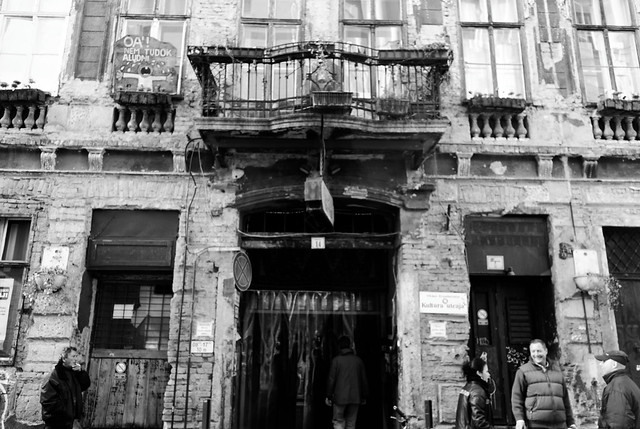

The ‘ruin pub’ is a peculiarly Hungarian
idea and all the more brilliant for it. Budapest Hungary
Recent times are not so grand and many of
these fantastic buildings are elegantly wasting away and unused. Enterprising
and imaginative entrepreneurs have decked out the interiors with art collective
decorations; bars, bands, films, food and DJ’s, all laid on to entertain and
turn a coin.
Szimpla is the first, biggest and best of
these ruin pubs. Situated in a seedy side street, it occupies the middle of a
large tenement building. The door is a gaping hole in brick, leading to heavy,
plastic meat curtains found in factories and warehouses. Everything is cracked,
crumbling and graffiti covered. The walls are slashed with leprous scars. If you can keep your nerve and enter, you have
done yourself a favour.
Once inside, we were confronted by a
twisted wonderland. A long bar selling every kind of ruin on one side faced a
decrepit staircase leading to more bars on the second floor. The front of the
building is roofed, the back is not. A screen the size of a removal’s van
showed black and white Soviet era information films. Punters sat in an old
roofless Trabant, smoking, opposite a hookah bar. A room walled in flat screens
shuddered and swirled like a kaleidoscope in time to the music. Posters for
gigs long gone papered the walls and sculptures hung in between. Neon tube lighting
snaked through the collaged walls. It looked like all the skips in Budapest Independence
Sunday
The morning after the night before. It’s
never clever is it? Never again until the next time, or Tuesday, as we became
forced to call it. To say we’d gone for it is an understatement. At home I
would have made it no further than my kitchen the day after a night like that.
I wasn’t at home, I was in eastern Europe with Frag. He is intrepid and nothing
can stop him.
Put your boots on and walk.
We wandered the empty Sunday city seeing
the sights and felt ill. After eating in a Lebanese café for no other reason
than it was called Titiz, we made for Andrassy
Avenue
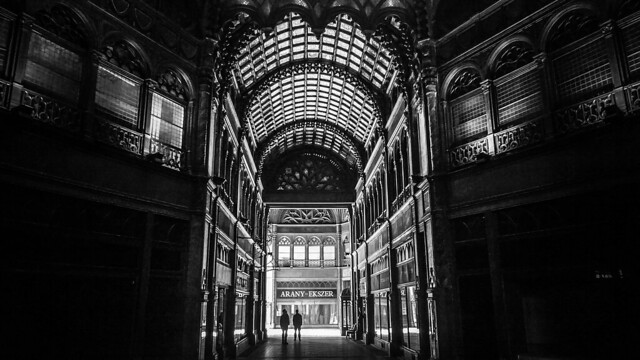

Café’s straight out of Tinker, Tailor,
Soldier, Spy have polished, dark wainscoting and leather sofas with cake stands
and doilies - next to shops selling weapons banned in most Western European
countries. Need a sword, a suit of armour, a throwing star, nunchuks, an
enormous military knife, vintage Luger, crossbow, long bow, assault rifle,
sniper sights, infra-red night goggles, garrotte with moulded, plastic handles?
Now you know where to go.
You bloody lunatic.
We meandered our way up Andrassy towards
the centre. Shops became grand houses with stone balconies behind large, black
steel security gates. These are the foreign embassies, existing in a reduced, shabby
grandeur. Eventually, we arrived at Independence
Square
Like an exclamation mark at the end of
Andrassy, it is expansive and grey stone paved. If you need to hold a sinister
rally, this is the place. A gigantic empty square backed by an imposing
semi-circle plinth of heroic proportions, raising up the kings and rulers of
what is now Hungary
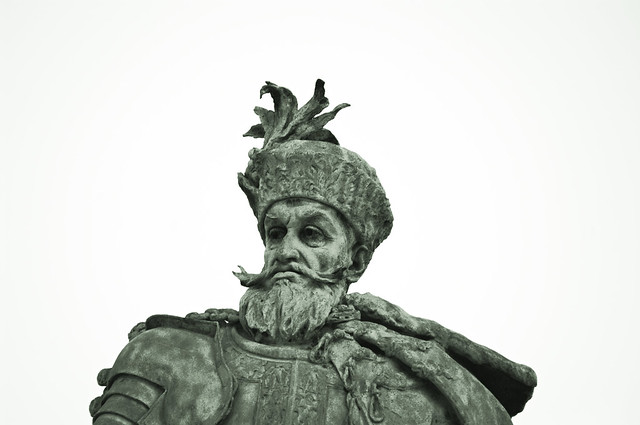

A timetable of tour groups marched behind
guides with ‘follow me’ umbrellas held aloft, lest they lose American’s Bud and
Martha and they are lost and rendered homeless. Budapest
This show city square backs onto a vast,
ornate, open air spa. Packed with flesh in the summer it is drained and cleaned
in the winter. It’s best that we were there in October, lest we would have had
to endure the sight of Frag in his budgie smugglers.
The Horror, the horror.
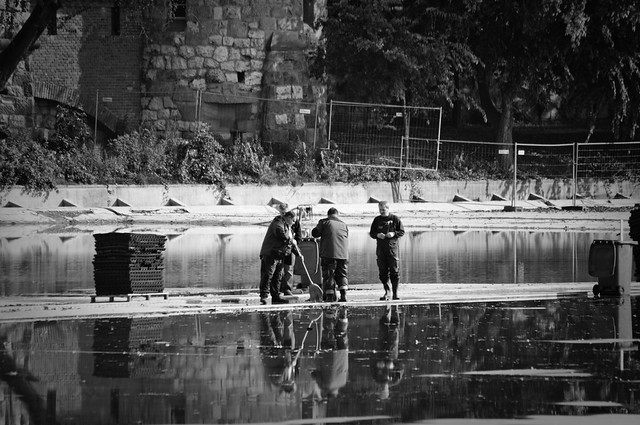
Behind the spa stands a fairy tale castle.
Now a museum that does not open on a Sunday, it was never the less, hugely impressive.
The largest windows I think I’ve ever seen allowed nobles and knaves to look
out over their magnificent, wooded hunting park, stretching into the distance
at the back. It has spires and turrets and arches and conical roofed towers for
damsels in distress to toss their golden locks from. All it needed was a dragon.
Instead it was guarded by a beautiful, elegant, old woman collecting for an
animal charity. I slipped her a Forint note. She spoke English.
“Thank you.”
“You have a wonderful city here. It is
majestic.”
“Oh, it used to be, when I was young. Now
the only thing majestic is our politicians’ bank accounts.”
“Are they thieves?”
In cut glass English, “Yes…just look
around. They don’t care. Our beauty is fading.”
She smiled a thin, frail smile and looked
way off, over the grand park, towards high rise flats in the distance.
Her life and Budapest
It was perfect melancholy to accompany the
slanting autumn sunlight through the leafless trees reaching out into the royal
park.
Goulash Revival
We made our way back towards the Jewish
quarter, passed the monolithic synagogue, into the maze of streets behind. I
still felt like dying. We really must have drunk the Danube
dry last night. It was agreed that we needed food before giving up for the day.
A hundred yards from our digs was a café
bar we’d already used. Run by two, young, hardworking local lads, it was just right
for me, right then. I saw a sign promising goulash. This hit a sweet spot in my
brain. I’ve not eaten goulash in years. I’m in Hungary
“I’m having goulash.” I announced to Frag.
“You dirty bastard.” He replied.
The boys could see we were in a bit of a
state and welcomed us with knowing grins. Frag sat fingering a menu, all indecisive.
I meant what I said and demanded goulash. It arrived in a small cauldron on a
curved, iron stand. I beamed so wide I had a flip top head. It smelled like
life itself and it tasted like heavenly faire. At that moment, at just the
right time and by pure serendipity, I had struck gold. Each spoonful made me
feel better. Not good, let’s face it we’d battered our aging systems, just many
times better. I actually began to feel like I might not die, just yet.
Frag, witnessing the transformation and my
mood lifting from cantankerous for the first time that day, became intrigued.
Then he ordered the goulash. As we left for our digs we smiled for the first
time since we rolled out of Szimpla the night before.
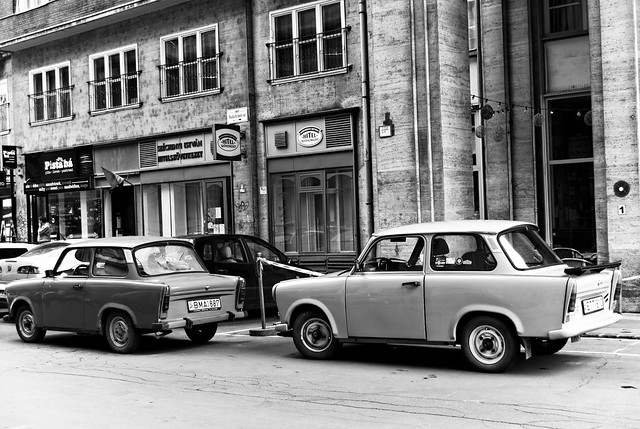
The Blue Horse
We ordered local beer and sat down, the
only customers. We were early.
After Saturday’s hi-jinks we were still a
little subdued. Self admonishing, we swore we would be sensible from now on.
Sat at the bar, we chatted idly to the
owner about the day’s news. An anti-government demonstration had been held in Budapest
The government were planning to tax the
internet. Hungary Hungary
We’d already seen ten thousand on our hotel
TV sets, protesting through the streets, into squares and down towards the Danube ’s bridges. It looked very impressive on the TV
reports beamed all over the world. A repeat demonstration was planned every two
days until the foolishness was dropped.
“The next demonstration will be bigger. It
is in Josef Naider Square
The man was insistent, eloquent and very
persuasive, as was the Hungarian bitter honey beer. I’d never been to an
anti-government demonstration in any country. How could we not attend?
No matter how old you are, you never
remember to know better.
Demonstrate
A sharp evening, October chill seeped from
the Danube as we made our way to Josef Naider Square
In the side streets off each thoroughfare, leading
to the squares and main streets, police were beginning to glut and block exits
and rat run routes. Mad Max armoured hordes of police with batons and thick,
matt black guns began to gather. Staring through blank riot shields and visors,
they looked more of a problem than a solution.
Black, armoured police vans with meshed
windows waiting at every intersection helped the intimidation. There was an
atmosphere brewing. Frag bought cigarettes from a government licensed tobacconist
shop to calm us. I watched as people joined the crowd until I had never seen so
many people in one place. In every direction the crowds made their way in from
the surrounding main streets. It was remarkable.
Arriving at Josef Naider Square
The ordinary people of Budapest had turned
out, every man jack of ‘em; the young grinning and giggling in excitement, the
old shuffling and puffing in the icy air, the middle aged remembering tightly
controlled Soviet childhoods and young families with the future in push chairs.
The square was full, yet still they
wriggled through the thickening block of humanity into any available space.
Steam from Impromptu hot drink stalls rolled over the massing crowd, lit from
above by the ornamental lights adorning the eaves of the imposing stone
buildings hemming the square.
The speechifying began. We didn’t need to
understand the language, the anger was clear. The crowd chanted and cheered
each speaker. Frag and I cheered along. The entire mass held their phones
aloft, we waved our phones too. Applause broke out and we clapped along.
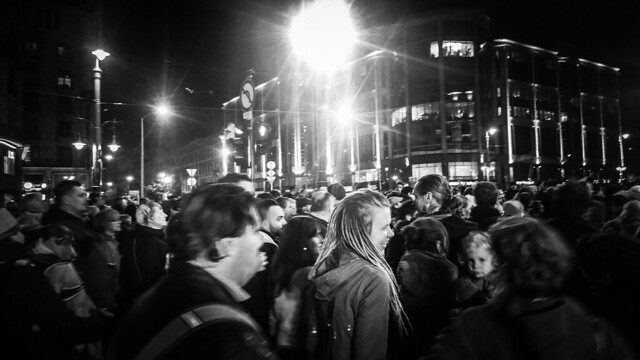

The protest had been going for around half
an hour when the crowd turned towards the back of the square and began to move
as one. I thought trouble had broken out, supposing that thousands of armed
police and tens of thousands of angry protesters were a volatile mix. I’d
underestimated the civility of the people of Budapest
Not having the courage of their convictions,
we realised it was bloody freezing and this makes an Englishman hungry and
thirsty. We’d done our bit, now it was time for food and alcohol to thaw us
out.
Threading against the crowd, we moved in
the opposite direction towards our evening. Then we came to crossing the road.
It was on the march route. It was so packed that moving crossways through them
was not an option. We waited for the politely pissed off mass of humanity to
pass. We waited and waited. We waited some more. Then we decided it was best to
keep waiting. We began to realise how big this event was. They chanted slogans
as they pushed on down the road and it seemed like there was no end to them.
I mentioned the civility of the people of Budapest
Forty eight hours after we departed Budapest
You are welcome, Hungary
The Secret Number
Frag had been given a phone number back in
Blighty. We amused ourselves with references to the secret number. I knew it
would not be a gentle mono-rail to a gift shop and how we laughed.
Now, at a loose end in Budapest
In the taxi, storied blocks of concrete
flashed by; domino stacked, impersonal, anonymous, flecked with the occasional
floral door marker, an attempt to personalise concrete conformity. Not a
tourist Budapest
The taxi raced the rusty brown train line,
with utility wiring strung loosely between concrete posts rushing parallel to
us. Nobody spoke and I wondered where the bloody Hell we were being ferried to.
Pulling up under a concrete overpass, the silent
driver pointed to an anonymous white wooden door in the side of a low factory
building. We paid the man and followed his directions. It was a very grim
location. Through the grubby door was a grubby corridor that abruptly turned
left into another grubby corridor. No windows, no signs, just follow. Finally,
we were faced by a cheerful young woman sat behind glass like a bank teller.
“Good afternoon, gentlemen.”
She pushed laminated menus into the tray
under the glass screen. We heard sharp, mechanical cracks and thuds from
nearby. The menus were for an assortment of guns.
There was the beginner package, the gamer
package, the I’ve seen too many films package, the hero in his own mind
package, the you’ll get yours, you bastards package, the potentially going
postal package, the I shouldn’t be allowed out ever again package and finally,
the somebody stop me, I’m not safe package.
It was insane. Sheer madness. You could,
for a nominal fee, hire an arsenal and fire live ammunition, with no training
beyond a video lasting 90 seconds, in a low corridor of a room.
I don’t like guns. In everyday life in England
Laszlo must be one of the largest, most
imposing human beings you could wish to not meet on a dark night in an alley or
anywhere else. It was a big room and this man filled it, an eclipse of a chap. He
was a good foot taller than is necessary, square of shoulder and jaw and
efficiently amiable in a military manner.
I had the feeling of being tolerated by a
man who could feed me to his children, on a whim. He was helpful like a farmer
is to livestock. Shaking hands with this enormous individual, I asked him if he
was ex-forces.
“Ex Hungarian Para-commando, ex Hungarian
military police.”
Think of Arnold Schwarzenegger smiling and
saying that and being slightly annoyed. Now you have the picture, let’s move
on.
He was quite friendly and he frightened me
to death. He bade us follow him to the firing range and we were not in a
position to ask any questions.
I’d always, naively, imagined a gun range
firing live ammunition to be out in the countryside. The shooting would take
place across a field of knee length grass, towards the man shaped targets by
the trees in the distance, just like the films.
We were led into a black room less than a
hundred metres long, with a low ceiling. To the left, wall racked and stacked,
was a library of weapons. Hand guns and rifles, shotguns and machine guns.
Sniper rifles attached to stands hung from the wall. The other wall and the
ceiling were covered in black silencing foam, like a recording studio. A
woodwork bench of guns and spent shells divided the room at our end, which was
itself divided in the middle by a framed, woodchip screen to separate the
shooters.
Wood chip screen. I’m no gun expert but…
After the very brief safety video on a wall
mounted TV, we were commanded, that is the correct term here, to step one by
one to the bench. Laszlo, ever helpful and intimidating, loaded the weapons and
handed them to me; the Magnum, the Glock, the sniper rifle, the AK 47, the
machine gun, on it went, culminating with the pump action shotgun.
I enjoyed the shooting and was horrified at
my accuracy and enjoyment. The recoil was sharp and sudden with the hand guns.
The magnum barrel shoots back as it fires, hold it like this, or lose your
thumbs. A pump action shot gun feels like it looks on the films - shockingly
violent.
I was glad when it was over. I’m glad I did
it but I don’t want another go. I have no need of these abominable machines.
Under the overpass outside, awaiting the
taxi, we were eager to leave. “My heart is still pounding.” said a visibly
shocked Frag. Not just me then.
Uneasy History
Half way along Andrassy, we saw The Torture
Museum.
Fading Daguerreotypes, embedded ovals
surround the building at head height, interspersed with tea light candles. A
roll call of innocents snuffed out by successive regimes, Nazi and Communist. Hungary Hungary
had a Nazi party well before the Austrian lunatic ranted and spewed his bile in
the beer halls of Munich
The torture chambers under Andrassy are
damp, squalid, brick boxes of misery.
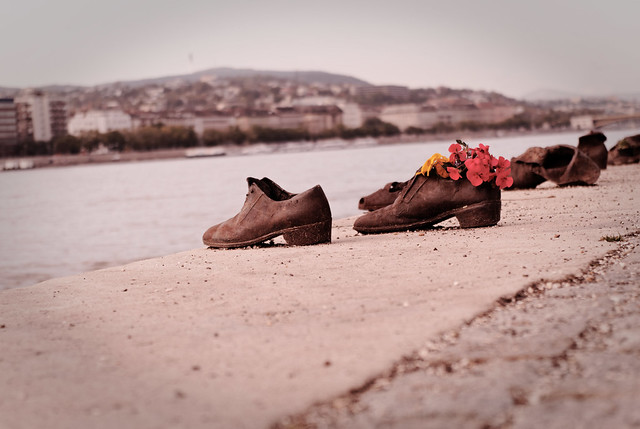

Parliament Square Parade
Arriving at the palatial parliament overlooking
the Danube , we walked into the past poking the
present. A contained contingent of soldiers in full fig marched across the
square. Small in number, they marched across the storied square to raise The
Flag. No crowds or ceremony attended, just tourists with camera phones and
ipads.
Left sided by the pomp with no fanfare, I
was almost mown down by marching soldiers.
It was Independence Day in Budapest England
Only a country so invaded and sat on by two
totalitarian regimes would take so much pride in independence and then ignore
the commemoration; or possibly an unpopular government attempting a nationalist
spin to tick boxes. Probably both.
Whilst Budapest Hungary
In 1956 the Soviet authorities had
attempted to impose a new constitution on the puppet government. The public had
naively massed to their parliament to protest. The Soviets in the Kremlin sent
in the tanks. They shelled and tank gunned a crowd of unarmed civilians.
Thousands were there, man, woman and child. The numbers murdered are disputed
but tanks versus an unarmed populace could only end one way. The massacre in
the square was huge and without conscience. The spark was the show of defiance
in parliament square. It’s generally
agreed that 30,000 died off the back of this rebellion. Tanks finished off the
wounded with their guns. Now, it appeared that no-one cared, or was too scared
to turn out. It appeared to have been hi-jacked by a very unpopular, right wing
government.
We descended incongruous steps in the
middle of the square to find the official memorial. An L shaped basement told
the story in a corporate museum manner, some original artefacts interspersed
with inter-active screens and leaflets of explanation. Frag beckoned me towards
one end of the L. There was a coffin covered in fresh flowers; either side
stood a motionless soldier in full dress uniform, standing to severe attention
with guns in a ceremonial, shoulder leaning fashion with funereal, martial
music, haunting out of speakers by each side of the Unknown Soldier. It wasn’t
just a memorial, it was a statement of the present government’s projected
image.
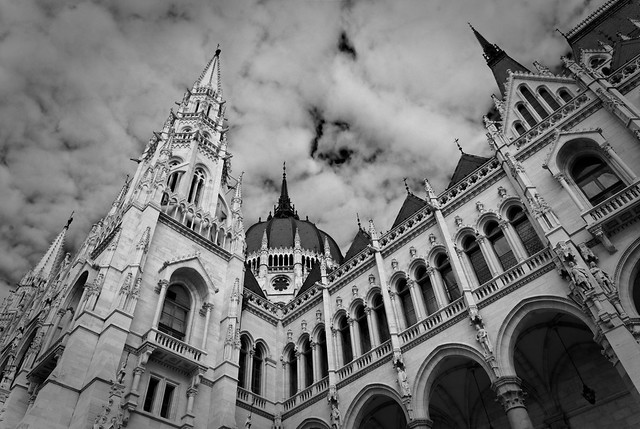

Later, I asked the lads who produce the
magic goulash about the display. They were both very proud of their heritage
and traditions but had utter contempt for their government and its ‘theft of
the past and our truth’. They were very angry at their government, just like
the crowds in Josef Naider Square
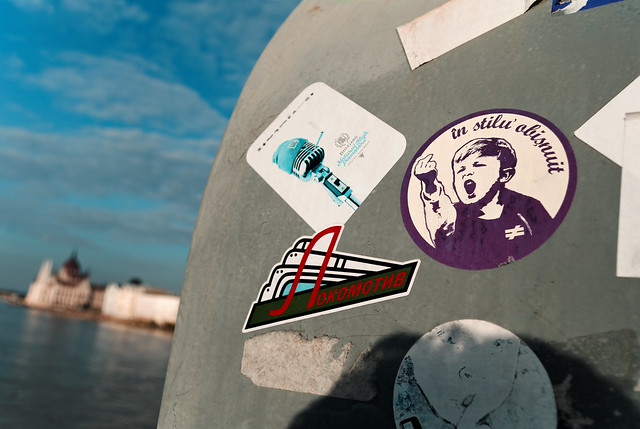

It was time to leave or, considering what
we’d seen, retreat. Back at our hotel we made to leave this exhausting stew of
a city. Budapest to Brussels
to Manchester
Tin Dog
